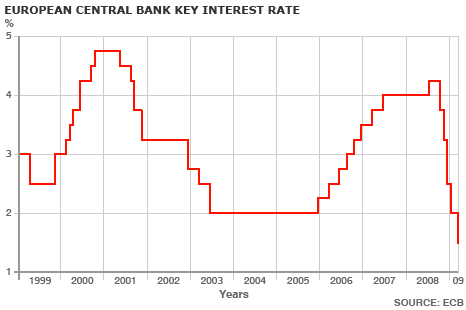April 4th 2009
Euro Gains after ECB Rate Cuts
Yesterday, the European Central Bank delivered a surprise to the forex markets; instead of cutting rates by the consensus expectation of 50 basis points, the ECB knocked down its benchmark lending rate by only .25%. The Bank also opted against certain non-standard measures that would accompany a change in monetary policy. At this point, all investors can do is wait until the next meeting to see if the ECB will finally intervene in credit markets as well as on behalf of beleaguered Eastern European currencies.
While Jean-Claude Trichet, President of the ECB, coyly refused to rule out the possibility of further rate cuts, analysts are puzzling over the relatively minuscule cut. After all, the consensus was that the ECB had already fallen well behind the curve, and was not struggling as quickly as possible to play catch up with its counterparts in the UK, US, and Switzerland. “ ‘By again buying time, the ECB risks falling further behind the curve…You cannot buy time forever.’ ”
 There are a few explanations. First of all, it’s possible that the ECB is selectively interpreting data as a basis for deriving a more optimistic economic forecast. Given the spate of recent bad news emanating from Europe, however, this seems unlikely. Besides, no less than Trichet himself has suggested that an economic recovery is unlikely to occur before 2010. There is also the possibility that the ECB is simply prioritizing its mandate to guard against inflation, rather than to stimulate economic growth. This theory is also unconvincing, given that price inflation has already fallen well below the ECB’s target of 2%.
There are a few explanations. First of all, it’s possible that the ECB is selectively interpreting data as a basis for deriving a more optimistic economic forecast. Given the spate of recent bad news emanating from Europe, however, this seems unlikely. Besides, no less than Trichet himself has suggested that an economic recovery is unlikely to occur before 2010. There is also the possibility that the ECB is simply prioritizing its mandate to guard against inflation, rather than to stimulate economic growth. This theory is also unconvincing, given that price inflation has already fallen well below the ECB’s target of 2%.
Perhaps, the best explanation is technical: “A 50 basis point cut would have required the ECB to cut the interest that it pays on deposits by banks to zero, from 0.5%, in order to maintain the current spread between the two of 1 percentage point.” Along the same lines, “European interest rates are lower than those in the U.S. when making a comparison of real inter-bank lending.” Ultimately, it’s probably the Bank’s conservatism that is behind both its comparatively tight monetary policy and its failure to unveil a quantitative easing plan that would mirror those put forth by the Fed and Bank of England. In other words, the door for more drastic monetary prescriptions has been strategically left open in the EU, while all but closed in the US and UK.
Curiously, the “the smaller-than-expected rate cut ‘remains an all-round booster for the single currency.’ ” Prevailing trading patterns and market sentiment seemed to herald a decline in the Euro, as investors have recently prioritized capital preservation and vigilance against deflation. Based on the positive market response, however, we can conclude that there are still some traders for whom interest rate differentials are important. After all, the only remaining alternatives to the EU (from the standpoint of yield) are Australia and New Zealand, but both of these economies/currencies are perceived as risky.
Alas, the ECB’s role is not to make currency traders happy. Unless the ECB follows up with a big move next month, the result could be a “very prolonged slump in euro-zone activity.”



